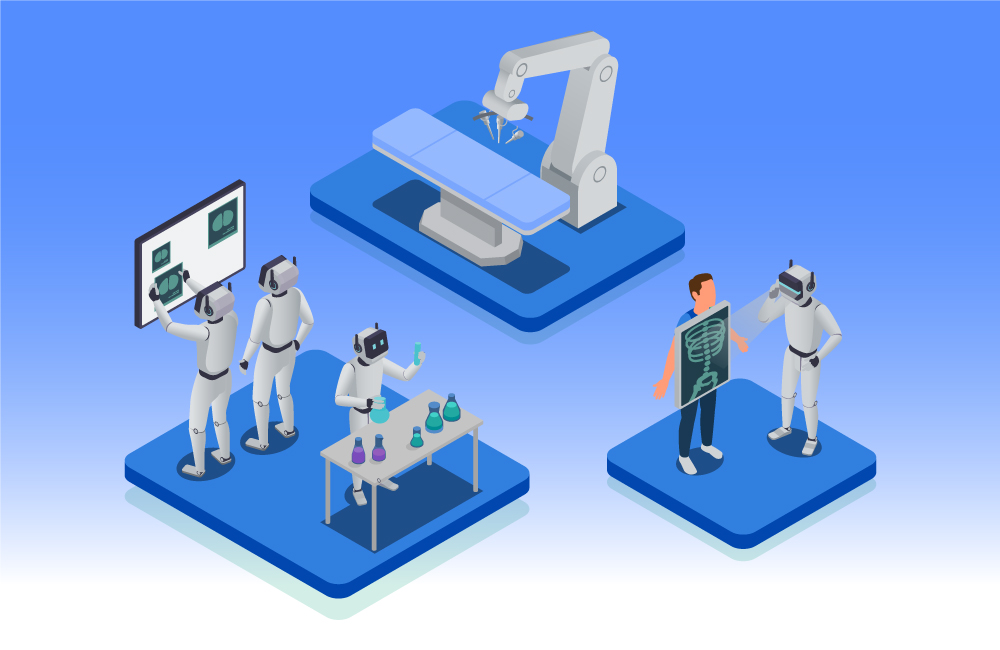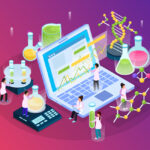How Artificial Intelligence is Transforming the Healthcare Industry
Healthcare systems worldwide encounter significant hurdles when striving to achieve the quadruple aim for healthcare: enhancing population health, improving the patient’s care experience, elevating the carer experience, and mitigating the escalating cost of care. Aging populations, the mounting burden of chronic illnesses, and increasing global healthcare expenses pose formidable challenges to governments, insurers, regulators, and healthcare providers, compelling them to seek innovation and reconfigure healthcare delivery models.
Furthermore, against the backdrop now catalyzed by the global pandemic, healthcare systems find themselves under pressure to both provide effective, high-quality care and institute large-scale transformations by harnessing real-world data-driven insights directly for patient care. The epidemic has also highlighted inequities in access to healthcare services and a shortage of healthcare professionals. The discipline of computer science known as artificial intelligence (AI) has the potential to profoundly alter how medicine is practiced and how healthcare is provided.
The application of Artificial Intelligence (AI) and technology in the healthcare sector demonstrates the possibility of addressing issues with supply and demand in the sector. A critical turning point in the development of healthcare and technology can be seen in the growing availability of various data types, including genomics, economic data, demographic data, clinical records, and phenotypic data, along with improvements in mobile devices, the Internet of Things (IoT), computational capabilities, and data security. This convergence is poised to reshape healthcare delivery models through AI-augmented healthcare systems.

Artificial Intelligence and robotics
Keeping well
The ability of Artificial Intelligence to help people maintain their health, lessen their need for frequent doctor visits, or at least reduce the frequency of such appointments, is one of the most significant potential benefits of the technology. Consumer health applications that include Artificial Intelligence and the Internet of Medical Things (IoMT) are already improving people’s lives. Technology applications and mobile apps are essential in encouraging healthier behaviors among individuals and facilitating the proactive management of a healthy lifestyle. They empower consumers to assume control of their health and well-being.
Artificial Intelligence amplifies the ability of healthcare professionals to gain deeper insights into the daily routines and requirements of the individuals they are responsible for. With this knowledge, healthcare providers can provide more valuable feedback, guidance, and assistance to help individuals in maintaining their health and overall well-being.
Early detection
Artificial Intelligence is already playing a vital role in the early and precise detection of diseases, such as cancer. For instance, the American Cancer Society notes that a substantial number of mammograms yield incorrect results, causing approximately 1 in 2 healthy women to receive a mistaken cancer diagnosis. AI technology is now enabling the review and interpretation of mammograms at a rate 30 times faster than previous methods, achieving an impressive accuracy rate of 99%.
This advancement significantly reduces the need for unnecessary and invasive biopsies, sparing patients from unnecessary procedures. Moreover, the widespread adoption of consumer wearables and other medical devices, coupled with AI, is revolutionizing the monitoring and early detection of conditions like heart disease. This integration allows doctors and carers to closely oversee patients, identifying potentially life-threatening episodes at earlier, more manageable stages. As a result, timely intervention and treatment become more feasible, potentially saving lives and improving overall health outcomes.
Diagnosis
IBM’s Watson for Health is playing a pivotal role in assisting healthcare organizations in harnessing the potential of cognitive technology to tap into vast repositories of health data, revolutionizing the diagnostic process. Watson can rapidly process and store an extensive volume of medical information, including every medical journal, symptom data, and case study on treatment and response from around the world. This capability far surpasses human capacity, enabling healthcare professionals to access invaluable insights exponentially faster.
Google’s DeepMind Health is collaborating with clinicians, researchers, and patients to address real-world healthcare challenges. This technology combines the principles of machine learning and systems neuroscience to construct potent general-purpose learning algorithms embedded within neural networks that closely mimic the functioning of the human brain. This innovative approach holds great promise for advancing healthcare and finding solutions to complex medical issues.
Decision making
Enhancing healthcare quality necessitates the seamless integration of extensive health data with well-timed and relevant decisions. Predictive analytics plays a crucial role in supporting clinical decision-making, guiding actions, and at the same time, simplifying administrative tasks. AI is making substantial progress in healthcare by utilizing pattern recognition to detect patients who could be susceptible to developing a medical condition or seeing a deterioration in their health due to various factors, including lifestyle choices, environmental influences, genomic factors, and others. This application of AI holds immense promise for early intervention and proactive healthcare management.
Treatment
Artificial Intelligence goes beyond merely scanning health records; it assists healthcare providers in identifying individuals with chronic illnesses who might be vulnerable to adverse events. This enables healthcare professionals to manage diseases more holistically, improving the coordination of care plans and assisting patients in managing and adhering to their long-term treatment regimens.
For more than three decades, robots have been a vital part of the medical industry. They range widely, from simple laboratory robots to highly developed surgical robots that can work with human surgeons or even carry out procedures on their own. Beyond surgical applications, these robots are employed in hospitals and labs to carry out monotonous chores, aid in physical therapy and rehabilitation, and help people with long-term medical issues.
End-of-life care
Compared to previous generations, people live far longer lives in the modern world. The process of dying has changed as we approach the end of our lives; it is now frequently characterized by a slow decline brought on by ailments like dementia, heart failure, and osteoporosis. Loneliness is also a prevalent challenge during this phase of life.
Robots hold the potential to revolutionize end-of-life care, offering vital support to individuals to maintain their independence for extended periods and decreasing their reliance on hospitals and care facilities. The integration of AI with advancements in humanoid design is pushing the boundaries, allowing robots to partake in ‘conversations’ and other social interactions with people. This keeps the minds of older people active and connected. This novel strategy not only raises the standard of living for those who are nearing the end of their lives, but it also provides important companionship and support.
Research
The path from a research laboratory to delivering a new drug to patients is both long and financially demanding. According to the California Biomedical Research Association, it usually takes approximately 12 years for a drug to move from the research stage to reaching patients. Only five of every 5,000 medications that are tested in preclinical studies make it to human trials, and of these five, only one is routinely approved for use in humans. Additionally, it costs $359 million on average for a business to guide a new treatment from the research lab to the patient.
The field of healthcare has benefited greatly from artificial intelligence (AI), particularly in the area of drug discovery. Utilizing the most recent advances in AI to speed up drug discovery and repurposing processes holds the potential to drastically reduce the time and costs associated with bringing new treatments to market. This represents a promising avenue for improving the efficiency and accessibility of pharmaceutical innovations.
Training
Artificial Intelligence offers a unique advantage in training by enabling individuals to engage in naturalistic simulations, a capability that basic computer-driven algorithms cannot replicate. With the emergence of natural speech and AI’s ability to instantly access a vast database of scenarios, the responses to questions, decisions, or guidance provided to trainees can be rigorously tested in ways that are challenging for humans to achieve. The training program can adapt and learn from the trainee’s previous responses, allowing for continuous adjustments to tailor the challenges to their specific learning needs.
Moreover, AI-powered training can take place anywhere, thanks to the integration of AI into smartphones. This means that individuals can engage in quick catch-up sessions, even after encountering a complex case in a clinical setting or while traveling. The convenience and accessibility afforded by AI-driven training represent a significant advancement in learning and skill development.
Examples and Practical Applications of AI in the Healthcare Sector
Artificial Intelligence (AI) holds significant promise for healthcare, offering substantial advantages to both healthcare providers and patients across various operational domains. These encompass enhancements in patient care, the management of chronic diseases, early identification of health risks, the automation and streamlining of workflows, and the optimization of healthcare processes. AI’s impact on healthcare extends from achieving precise diagnoses to maximizing the efficiency of hospital operations. Here are several key ways in which AI is spearheading a transformation in the healthcare sector and propelling it toward digital advancement:
Offering Robot-Assisted surgery
One of the most prevalent applications of Artificial Intelligence in healthcare is its transformative impact on surgical procedures. AI, in conjunction with collaborative robots, has brought about a revolution in surgeries by reducing the risks associated with blood loss, pain, and other adverse effects. Additionally, the integration of AI into healthcare has empowered surgeons to execute intricate surgeries with heightened precision, resulting in swifter and smoother post-operative recoveries for patients.
For instance, Maastricht University Medical Centre has harnessed AI-driven robots to perform the delicate task of suturing tiny blood vessels, some as thin as 0.03 millimeters. The incorporation of AI in the medical field equips surgeons with real-time information and insights into a patient’s current health status. This AI-supported data enables healthcare professionals to make prompt, informed decisions both before and during procedures, ultimately ensuring the best possible outcomes for patients.
Detecting Fraud
According to the US Justice Department, approximately 3% of healthcare claims in the country are fraudulent, resulting in an annual loss of around $100 billion. AI-based healthcare solutions offer a powerful tool for identifying these invalid claims and expediting the processing, approval, and payment of legitimate ones. Beyond fraud detection, AI in healthcare also plays a vital role in safeguarding patient data from theft and breaches.
Prominent healthcare service providers like Harvard Pilgrim Health are increasingly adopting Artificial Intelligence technology to combat healthcare fraud. They leverage AI-driven fraud detection systems to identify suspicious claims and detect fraudulent behavior, contributing to more efficient and secure healthcare operations.
Supporting Clinical Decisions
The way that medical professionals make critical decisions is changing radically thanks to advances in artificial intelligence (AI) and machine learning (ML). AI provides vital data-based insights to help healthcare professionals with tasks like diagnosing illnesses, developing treatment plans, and monitoring patient well-being. Furthermore, this technology offers significant assistance in decision-making, particularly in data-heavy medical specialties like ophthalmology, radiology, and pathology.
The prospect of autonomous task execution using Artificial Intelligence is also on the horizon. With the aid of natural language processing, AI can facilitate the translation of clinical notes within Electronic Health Records (EHRs). This capability enables clinicians to input data just once, streamlining documentation processes and enhancing overall efficiency in healthcare workflows.
Assisting in Repetitive Jobs
Healthcare is rapidly advancing into the realm of Cognitive Assistants, equipped with reasoning abilities, analytical prowess, and an extensive repository of medical knowledge. A notable recent development is the introduction of the Medical Sieve algorithm, deemed proficient in aiding decisions within cardiology and radiology. This cognitive health assistant specializes in the swift and accurate analysis of radiology images, expediting the detection of medical issues with heightened reliability.
Medical Sieve stands as a prime illustration of Artificial Intelligence transformative impact on healthcare. Nevertheless, there exist other notable examples, such as Enlitic, which seeks to harness the power of deep learning and medical data integration to enhance advanced diagnostics and elevate the quality of patient care. These pioneering advancements in AI are reshaping the landscape of healthcare, promising significant benefits for both providers and patients alike.
Changing Online and In-Person Consultations
The Babylon App serves as a concrete illustration of how Artificial Intelligence applications are reshaping doctor consultations within the healthcare sector. This application provides online medical consultations and healthcare services, leveraging AI to deliver tailored advice based on a patient’s medical history and available medical knowledge. The functionality of this AI-driven app is designed to simplify the user experience. Patients need only report their symptoms, and the app utilizes speech recognition technology to cross-reference these symptoms with a comprehensive database of diseases.
After gathering relevant patient history and circumstances, the app offers a recommended course of action for the patient to follow. The soaring demand for healthcare apps incorporating AI technology is unmistakable, with over 54% of mobile health app users showing a willingness to engage with AI and Robotics for their medical consultation requirements. This burgeoning AI trend underscores the increasing popularity and acceptance of AI solutions within the healthcare domain.
Medication Management and Health Assistance
Sense.ly, a pioneering medical startup, has introduced Molly, the world’s first digital nurse. Molly, with her friendly appearance and pleasant voice, is designed to oversee the condition and treatment of patients. This virtual nurse is accessible through a mobile app that employs machine learning to assist patients dealing with chronic conditions in the period between their medical appointments. The app offers tailored, proven monitoring and follow-up care, with a particular emphasis on chronic diseases. Molly ensures patients receive timely medication reminders and monitors their adherence, illustrating the immense value of AI in healthcare.
Drug Creation
The process of developing pharmaceuticals through clinical trials can span over a decade and incur costs amounting to billions of dollars. The incorporation of AI into drug discovery not only expedites the process but also renders it highly cost-effective. One notable example is Atomwise, a network employing supercomputers to unearth potential therapies within vast molecular structure databases.
In 2015, Atomwise harnessed its Artificial Intelligence technology to identify existing medications already available on the market that could be repurposed for treating the Ebola virus. Remarkably, they identified two such drugs within a single day, a task that would have otherwise taken years through conventional methods. This underscores the remarkable efficiency and potential of AI in revolutionizing drug discovery and advancing the field of medicine.
Precision Medicine
Artificial Intelligence has made a profound impact on genomics and genetics within the field of medicine. This technology plays a pivotal role in discerning patterns within extensive datasets that combine medical records and genetic information. Through this analysis, AI assists in uncovering connections between diseases and genetic mutations. Consequently, AI can elucidate the cellular implications of DNA alterations resulting from genetic variations, whether they occur naturally or are therapeutically induced. This invaluable insight contributes significantly to our understanding of genetics and its relevance in the realm of healthcare.
Analysis of a Healthcare System
With the ongoing shift towards digital formats for healthcare invoices, accessing information about the treating physician, the treatment itself, and the medical facility has become more convenient than ever. Through data mining, hospitals can readily extract and analyze this information, allowing them to generate reports that shed light on recurring errors in the treatment of specific medical conditions.
This valuable insight serves as a foundation for improvement efforts and helps prevent unnecessary hospitalizations when required. In the Netherlands, a company named Zorgprisma Publiek has been at the forefront of this endeavor. They collect and analyze hospital invoices using Watson technology, enabling them to mine the amassed data and derive meaningful insights for the betterment of healthcare practices and patient outcomes.
Automating Image Diagnosis
One of the most remarkable applications of Artificial Intelligence in healthcare lies in its computer vision capabilities. Hospitals and medical clinics harness Artificial Intelligence technology to identify anomalies within various types of medical images, such as CT scans or radiology images. This image recognition aids healthcare professionals in diagnosing conditions like tumors and kidney and liver infections, ultimately leading to improved cancer prognosis and more accurate medical assessments.
A compelling illustration of AI-driven visual perception can be found at the UVA University Hospital. Here, Artificial Intelligence and machine learning are employed in healthcare to analyze biopsy images of children, effectively distinguishing between environmental enteropathy and celiac disease with the same level of accuracy as human doctors. These examples underscore the transformative potential of Artificial Intelligence in healthcare, showcasing real-world applications and the profound impact it can have on medical diagnoses and patient outcomes.
Conclusion
The healthcare sector faces a multitude of challenges, driven by factors such as an aging population and increasing rates of chronic diseases. These challenges underscore the pressing need for innovative solutions in healthcare. While AI-powered solutions have taken initial steps in addressing these issues, their overall impact on the global healthcare industry has not yet reached a substantial level, despite the significant media attention they have garnered.
However, if we can successfully tackle several key challenges in the years to come, Artificial Intelligence has the potential to assume a leading role in shaping the operations of future healthcare systems. It can act as a vital resource for augmenting clinical capabilities and ensuring optimal patient outcomes. The journey towards harnessing Artificial Intelligence full potential in healthcare is ongoing, and overcoming these challenges will be crucial to realizing its transformative role in the industry.







